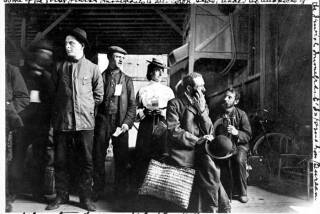Article on Haym Salomon
- Share via
My attention has been called to an article (Aug. 7) by Allan Jalon headlined “Quest for Memorial to ‘Jewish Founding Father’ Makes a Capitol Gain,” in which I am cited inaccurately.
I enclose a copy of a 72-page paper of mine on Haym Salomon published in the American Jewish Historical Quarterly in September and December, 1977, entitled “Excerpts from Robert Morris’ ‘Diaries in the Office of Finance, 1781-1784,’ Referring to Haym Salomon and Other Jews.” I conclude my introduction to this work with the following statement: “Haym Salomon therefore emerges as a patriotic merchant who, after escaping from the British occupation and the threat of reimprisonment in New York, went to Philadelphia and became a successful and resourceful broker, a public-spirited citizen, and a leader in the Philadelphia Jewish congregation. The following record will aid scholar and general reader achieve a true estimate of Salomon’s contributions, and should strip away the unhealthful myths that have been woven about his name.”
Whether or not Haym Salomon merits a statue in the Capitol in Washington is for others to decide.
Mr. Jalon says that Haym Salomon was a “banker.” He was not. He was was a broker who sold U.S. government securities for a commission. He was not a rich man, and there is no record that he ever lent money to our government.
As far back as 1931, a scholar in American Jewish history, Max Kohler, published a pamphlet entitled, “Haym Salomon, The Patriot Broker of the Revolution, His Real Achievements and Their Exaggeration” (New York, 1931), in which, as I write on Page 10 of my own paper, Kohler “revolutionized the status of knowledge about Haym Salomon and for the first time put it upon a historically scientific basis.” My own researches have corroborated Kohler’s work and the work of others who investigated the documentary evidence in the field. None of us, I wrote, “question any statements about himself or his own services or activities made by Haym Salomon himself; they do eliminate from serious historical consideration false claims and legends built up about Salomon, chiefly by his son, Haym M. Salomon (1785-1858).”
Mr. Jalon cites the Dictionary of American Biography as saying, “Salomon also personally loaned $658,000 to the cause.” That article in the Dictionary of American Biography was written before the new evidence was made available and is, on this score, as unreliable as the Universal Jewish Encyclopedia article on Haym Salomon and other articles that do not take into account the research done as far back as more than 50 years ago.
In 1975 an economic historian, Samuel Rezneck, published a work entitled “Unrecognized Patriots, The Jews in the American Revolution.” After examining and rejecting the exaggerations and false claims about Haym Salomon’s very creditable work as a very effective broker selling government securities during the time of the Revolution, Rezneck also points out that “the clamor for compensation and honorific recognition of Salomon’s services tended to reinforce the malignant financial stereotype of the Jew.” The whole idea that Haym Salomon somehow was the “financier of the Revolution” was tailor-made for distortion by anti-Semites, who will say that while others fought and died for the Revolution, what did Jews do--they financed the Revolution. It is shocking therefore to read the headline over Jalon’s article: “Quest For Memorial to ‘Jewish Founding Father’ Makes a Capitol Gain.” What else is the pun upon “Capital Gain” in that headline but an anti-Semitic implication that when you are dealing with a Jewish Founding Father the alleged Jewish obsession with money-making must be involved? For such an implication the editors of The Los Angeles Times owe the Jewish people and the general American public an apology.
MORRIS U. SCHAPPES
New York
Schappes is the editor of Jewish Currents.
More to Read
Sign up for Essential California
The most important California stories and recommendations in your inbox every morning.
You may occasionally receive promotional content from the Los Angeles Times.













